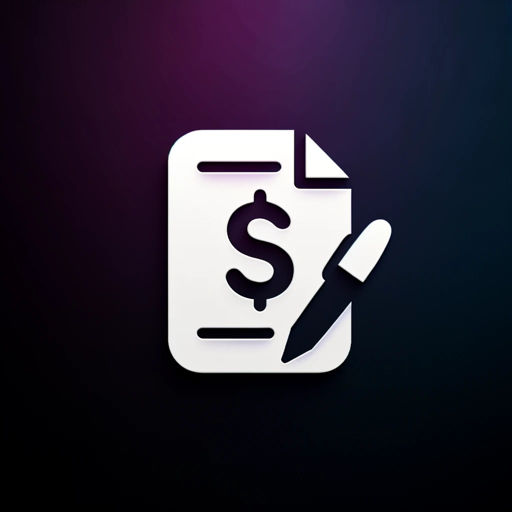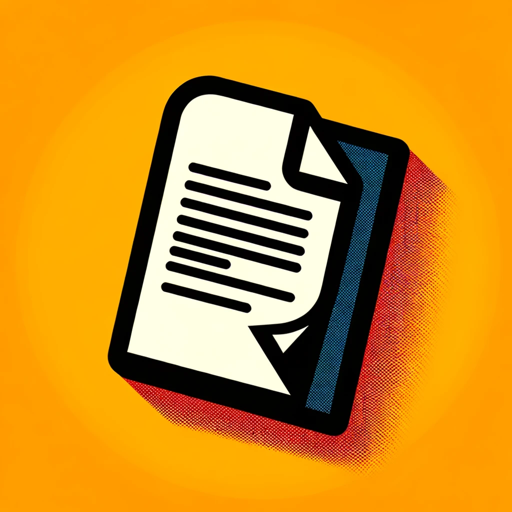Request for Proposal Guide-RFP assistance tool
AI-Powered RFP Writing Assistant
Upload your RFP document for analysis
Summarize my RFP's key requirements
Suggest improvements for my existing proposal
Help me draft my RFP proposal
Related Tools
Load More
Government Bid RFP Proposal Assistant
I assist in writing government bid proposals, analyzing RFPs, and guiding proposal drafting.

Research Proposal Writer
Upload a filled Research Project Canvas to generate a research project description

RFP Writer
I'll help you draft a detailed request for proposal for any project

LDA - Proposal Writer v4
Create a unique, custom job proposal

RFP Proposal Pro (IT / Software Sales assistant)
Step 1: Upload RFP Step 2: Prompt: I need a comprehensive summary of the RFP. Split the summary in multiple blocks / section. After giving me one section wait for my command to move to the next section. Step 3: Prompt: Move to the next section, please :)

Proposal Genius
Crafts personalized, solution-oriented Upwork proposals.
20.0 / 5 (200 votes)
Detailed Introduction to Request for Proposal Guide
The Request for Proposal (RFP) Guide is a customized tool designed to assist users in navigating the complexities of creating competitive and compelling responses to RFPs, particularly in the engineering sector. The primary functions include summarizing RFP documents, suggesting relevant past projects, assisting in drafting proposal texts, and providing iterative feedback for improvements. For instance, when a user uploads an RFP document, the guide analyzes the content, highlights key details such as deadlines, technical requirements, and evaluation criteria, and then helps the user align their proposal with these specifics. This ensures that the proposal is not only compliant but also stands out by showcasing relevant qualifications and past project successes.

Main Functions of Request for Proposal Guide
RFP Document Analysis and Summarization
Example
A user uploads an RFP for a new infrastructure project. The guide extracts and highlights critical details such as submission deadlines, technical specifications, budget constraints, and evaluation criteria.
Scenario
An engineering firm receives an RFP for constructing a bridge. By using the guide, they quickly understand the key requirements and can immediately start aligning their proposal with the client's needs.
Suggesting Relevant Past Projects
Example
The guide reviews the RFP's requirements and suggests examples of similar past projects the user has completed, helping to illustrate their experience and expertise.
Scenario
A consultancy firm bidding for a renewable energy project is prompted to include details from their previous successful wind farm project, which closely matches the new project's scope and challenges.
Drafting Initial Proposal Text
Example
Based on the RFP details and past project examples, the guide assists in drafting sections of the proposal, ensuring they are tailored to meet the specific requirements and showcase the user’s strengths.
Scenario
A software development company uses the guide to draft the technical approach and project timeline sections of their proposal, ensuring these align with the client's outlined needs and deadlines.
Ideal Users of Request for Proposal Guide Services
Engineering Firms
These firms benefit significantly from the guide as it helps them quickly understand RFP requirements, align their proposals with technical specifications, and showcase relevant projects that demonstrate their capability to handle similar tasks.
Consulting and Professional Services Firms
These firms often respond to complex RFPs and can use the guide to streamline the proposal creation process, ensuring their responses are compliant, compelling, and showcase their expertise through relevant project examples.

How to Use Request for Proposal Guide
1
Visit aichatonline.org for a free trial without login, no need for ChatGPT Plus.
2
Upload the Request for Proposal (RFP) document to the tool.
3
The tool summarizes the RFP, highlighting key details and requirements.
4
Receive suggestions for relevant past projects and share details of similar projects you've undertaken.
5
Draft the initial proposal text with the tool's assistance and get iterative feedback for improvement.
Try other advanced and practical GPTs
编程随想
AI-powered solutions for every task.

Pine Assist
AI-powered Pine Script Assistant

Bubble.io Helper: Documentation Assistant
AI-Powered Tool for Documentation Clarity

Nimble Books: The AI Lab for Book-Lovers
AI-powered insights for book-lovers

LogoGPT
Create Professional Logos with AI

Python Tutor
AI-powered Python code visualization

Swirly - ウミガメのスープ
Unravel mysteries with AI-powered logic.
StyleMaster
AI-powered style emulation for any text

InsightsNotes
AI-driven insights for smarter project management.

图像故事编织师
AI-powered storytelling from your images

CellGpt
AI-powered expertise for single cell analysis.

书评来了
AI-powered book review assistant.

- Proposal Writing
- RFP Analysis
- Draft Feedback
- Project Examples
- Engineering Proposals
Q&A about Request for Proposal Guide
What is the primary function of the Request for Proposal Guide?
The primary function is to assist users in creating competitive engineering proposals by providing a step-by-step process, including summarizing RFPs, suggesting past project examples, and offering iterative feedback on drafts.
Do I need to log in or have a subscription to use the tool?
No, you can access the tool for free without logging in or needing a ChatGPT Plus subscription by visiting aichatonline.org.
Can the tool help with existing proposals?
Yes, the tool can provide detailed suggestions for enhancing existing proposals, ensuring they are compelling and competitive.
What types of projects can the Request for Proposal Guide assist with?
The tool is optimized for engineering projects but can be adapted for various fields requiring detailed and structured proposal responses.
How does the tool ensure the proposals are competitive?
The tool incorporates best practices such as understanding the audience, demonstrating qualifications through examples, maintaining brevity, and providing proactive feedback.